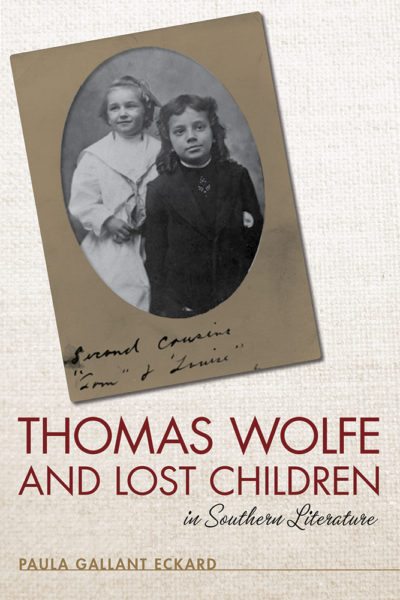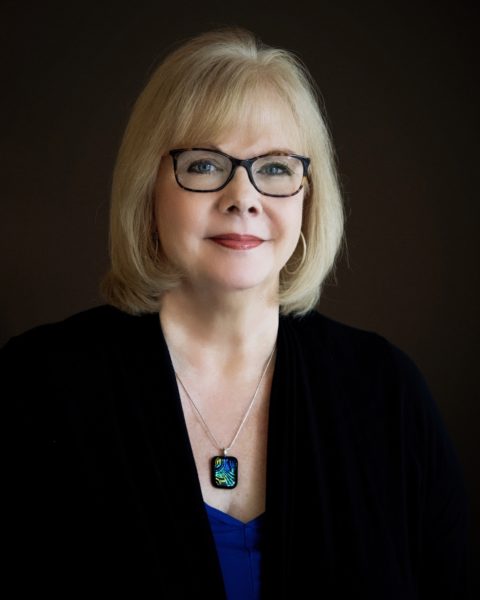Author Explores Concept of ‘Lostness’ in Southern Literature

Stories of the American South are steeped in a sense of lostness, often seen through the eyes of children as they experience loss, grief and tragedy.
In her book, Thomas Wolfe and Lost Children in Southern Literature (The University of Tennessee Press), UNC Charlotte scholar Paula Gallant Eckard calls upon Thomas Wolfe’s evocative and autobiographical novella The Lost Boy as a touchstone for her analysis of a group of contemporary southern novels.
“My book examines the motif of the lost child, the impact of change and loss on children, and the sense of ‘lostness’ that pervades the work of many Southern writers,” says Eckard, who has edited The Thomas Wolfe Review since 2013. Her book grew out of her years of research and teaching of The Lost Boy and other works of Southern literature.
The stories told in Fred Chappell’s I Am One of You Forever, Mark Powell’s Prodigals, Kaye Gibbons’ Ellen Foster, Sue Monk Kidd’s The Secret Life of Bees, Bobbie Ann Mason’s In Country, Robert Olmstead’s Coal Black Horse, and Lee Smith’s On Agate Hill take place during different historical periods. Each work is cast against the backdrop of the South during eras of change and conflict from the Civil War and Reconstruction to the Vietnam War and the Civil Rights Era.
 Lostness in these novels is understood as a complex state with multiple root causes, such as losing one’s way, losing something or someone important, or losing out on life opportunities. Young characters embark on personal quests to find someone or something or to resolve their grief or struggle.
Lostness in these novels is understood as a complex state with multiple root causes, such as losing one’s way, losing something or someone important, or losing out on life opportunities. Young characters embark on personal quests to find someone or something or to resolve their grief or struggle.
As they have delved into The Lost Boy and other Southern literature, Eckard’s students have found commonalities between the characters in the books. They seemed to circle back to Wolfe’s novella, published in 1937, with what she calls a knowing sympathy that bridged his generation and theirs.
For Eckard, Hurricane Katrina’s crushing devastation and the way it ripped apart lives proved a pivotal moment that pushed her forward in researching and writing the book.
“I just remember being so horrified at what was taking place,” she says. “The utter lostness of homes, families, children, even animals. It was lostness on a scale that I had never seen before. Even though 9/11 was so awful, this was somehow different because it was a slow unfolding of trauma that destroyed so many people’s lives.”
A former nurse and childbirth educator, Eckard became interested in Wolfe at a young age. “My interest grew from being a North Carolina resident – and from visiting his mother’s old boarding house, the Old Kentucky Home, now the Thomas Wolfe Memorial, in Asheville, North Carolina,” she says. “I was an avid reader and had already read Wolfe’s Look Homeward, Angel, and I found its rich, deep and exuberant language exciting. From there, I started seeing connections between Wolfe and other Southern writers with North Carolina ties.”
Given the time period of his life, some racist themes exist in Wolfe’s books. Yet, Eckard sees signs that Wolfe was changing in his views.
“Wolfe’s first publication was when he in his 20s, and he died at age 38, so he lived a short life,” she says. “But what happened during that time period was Hitler coming to power, and Wolfe, whose girlfriend was Jewish, began to see the discrimination and atrocities taking place with the Jewish people.”
Just before he wrote The Lost Boy, Wolfe traveled on a train from Germany bound for Paris. The train stopped, and the Gestapo came aboard to arrest Wolfe’s traveling companion, because he was Jewish and leaving the country with more currency than Nazi law would allow.
“It was a very troubling and disturbing incident to Wolfe,” Eckard says.
It seems clear that he had begun to perceive parallels in the treatment of black people in the South, when thinking about Nazi actions, she says. “The Lost Boy was published a year before his death, and there’s a passage that speaks to the mother’s racism,” she says. “Though he’s not directly challenging it, Wolfe presents it in a way that you know he is not condoning it.”
 His treatment of interactions and conflict seem different in later books than in his first novel, she says. “Wolfe especially was a man ahead of his time, very aware of class difference and the impact of big business and greed on people as well,” she says. “His novels explore a quest for home and belonging. I actually think in today’s world we are seeing part of what he experienced, a fracturing of community.”
His treatment of interactions and conflict seem different in later books than in his first novel, she says. “Wolfe especially was a man ahead of his time, very aware of class difference and the impact of big business and greed on people as well,” she says. “His novels explore a quest for home and belonging. I actually think in today’s world we are seeing part of what he experienced, a fracturing of community.”
In her classes, Eckard tries to convey the idea of building community and belonging. She works to engage her students and foster communication among class members within the first few days of class so that everyone knows one another by the second week.
“I frequently bring food to class to share, as do students from time to time,” Eckard says. “It’s not just food for food’s sake, but a way for people to bond and connect. As Wolfe demonstrates through his writing, we all experience loss – it’s how you grow. But having a solid community around you makes it much easier. Food seems to help the process along.”
Eckard’s next project is also focused on Wolfe, drawing more directly from her earlier career in nursing by looking at how Wolfe treats issues such as death and illness in his writing. Her project falls within the interdisciplinary field of narrative medicine.
“Narrative medicine emerged as part of the medical humanities movement, to help patients and families voice their experiences of illness,” she says. “The hope is that health care professionals will treat patients as humans with individual lives and stories, rather than just another clinical assessment. By encouraging doctors to look at the whole story of how a patient became ill and what the experience is like, a more humane and individualized treatment can be provided.”
Eckard will take theories from prominent experts in narrative medicine and apply them to Wolfe’s writings, to better understand his obsession with illness and death stemming from personal family tragedies. She wants to show how storytelling and literature are central to understanding illness, something Wolfe seemed to instinctively know.
“As a nurse, I found it especially true that literature helped me make sense of things,” Eckard says. “Literature helped me understand my patients better, made me a little more compassionate, and have a different perspective of illness than what was just provided from my clinical training. I’ve seen plenty of trauma and suffering, but literature put the pieces together to help me make sense of what it really means to be fully human.”
Words: Tyler Harris | Image of Eckard: Lynn Roberson